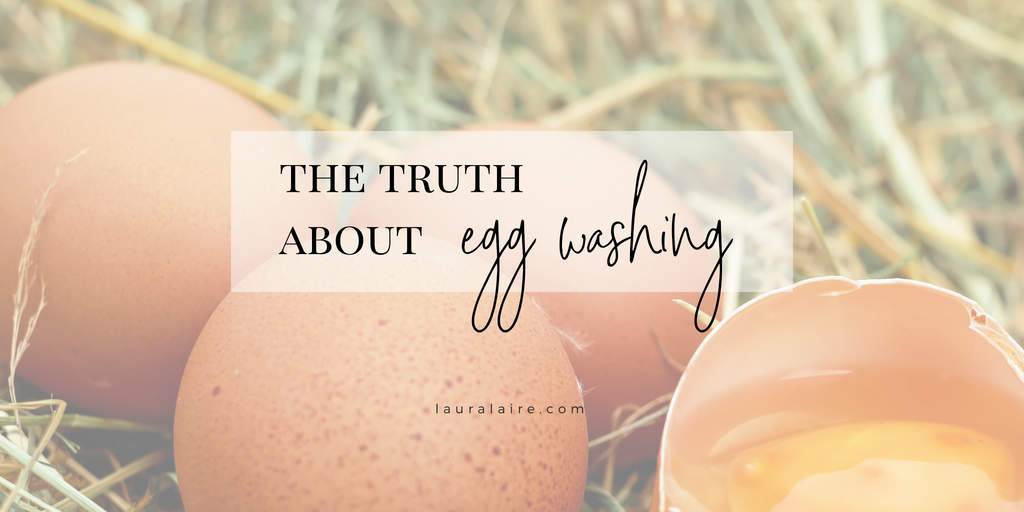The Truth About Egg Washing

Why do we chill eggs and the rest of the world doesn’t? Since I went to Europe the past two years, I began wondering why it’s safe to leave eggs at room temperature in stores, stacked on shelves, out in the open and not in fridges like in the U.S.?
This is an excerpt directly from the Food Safety of Ireland website:
“Is washing of eggs recommended?
No, because washing may aid the transfer of harmful bacteria like Salmonella from the outside to the inside of the egg.The use of chemical detergents or sanitisers in the wash water may not help, because some chemicals may actually increase the porosity of the shell making it easier for Salmonella to cross the shell barrier.
Getting egg washing right to avoid all these increased risks is not simple, and for that reason it is much safer not to wash them at all, but to concentrate on good husbandry, and the production of eggs that are clean in the first place.”
Unwashed eggs can be collected and then left out on your kitchen counter at room temperature for several weeks, where they will still be perfectly edible, and quite fresh, just as they were when they were laid. If the hens had a party and the eggs look especially dirty, all you need is a clean toothbrush to scrap off dirt and debris. If washing is necessary due to excessive mud or feces, just make sure the water is running and warm, then refrigerate.
In the U.S., eggs are federally regulated to be washed and sanitized before they are sold to consumers. The regulation was put in place to prevent “dirty” eggs with traces of chicken manure or other contaminants on them from reaching customers. Not only could this potentially allow micro-organisms to transfer to the inside of the egg through the porous surface, but it could also pose a contamination issue when customers touched other items or surfaces during food preparation.
To prevent these situations from occurring, the regulation states that all eggs must be washed in water that is at least 90 degrees Fahrenheit and at least 20 degrees warmer than the inside of the egg. A detergent must be used and the eggs must be rinsed afterward with a warm water rinse that contains a chemical sanitizer. The eggs must also be thoroughly dried to prevent bacterial growth.
Sounds like it makes sense, until you hear about the flip side of the coin.
If proper washing standards aren’t maintained, for instance the wash water is too cold or the wash water isn’t changed regularly, the eggs are subjected to ideal conditions for bacterial growth and contamination.
In fact, water that is too cold will actually create a vacuum effect and pull any bacteria that is on the shell into the interior of the egg.
Eggs are laid with a natural coating on the shell that is applied as the last step in the laying process called the “bloom” or sometimes the “cuticle”. This coating is the first line of defense in keeping air and bacteria out of the egg. This liquid coating that surrounds the outside of the egg as it is laid by the hen, naturally protects against contamination and prevents moisture loss. But egg washing can actually damage this protective layer, making the egg more susceptible to contamination. Since eggshells are porous, if you wash your eggs as soon as you collect them, you are removing that natural barrier.
The bigger picture actually goes back to the conditions that the eggs are laid in – the chicken coops.
If hens are raised and maintained in a clean, humane environment, the need for egg washing can be avoided in the first place. Factory farmed hens are unfortunately typically raised in deplorable conditions, making them more likely to be contaminated with fecal matter, and therefore “need” to be washed, or should we say sanitized.
Buying eggs from a humane, free-range farm in your community or even starting your own chicken coop in your backyard, are the easiest ways to get around this issue.
What’s the big difference between farm fresh eggs and store bought anyway?
Farm Fresh eggs have:
• 1/3 less cholesterol • 1/4 less saturated fat • 2/3 more vitamin A• 2 times more omega-3 fatty acids• 3 times more vitamin E• 7 times more beta carotene
“The hens in factory egg farms are fed a special feed that makes their yolks yellow and studies have shown that if factory farm hens are not fed that special feed their yolks would be completely white because they are not allowed to eat bugs or grass.”
I get my eggs from a source I know and trust at local farmers markets. They don’t use GMO feed, the chickens run around and eat bugs and live in an open environment where they roam around. They are happy hens and you can tell by the school-bus-yellow yolk. When you put it side by side, it’s pretty astounding to notice the difference. The eggs don’t need sanitizer, nor washing, though we do store the eggs in a refrigerator so they keep longer. Unfortunately, I don’t always make it to the farmers market every Saturday for eggs. (Insert sad face, because I am an egg nazi or egg snob! Farm fresh or not at all!) Just make sure you wash your hands during food preparation when using farm fresh eggs. Find a local farmer you trust or at least pick up some free range Happy Hen’s at Whole Foods. It’s the simpler – and safer – way to have fresh eggs in the morning that haven’t been swimming in a “chlorinated pool!
Sources:
https://www.theprairiehomestead.com/2011/10/eggs-to-wash-or-not-to-wash.html
https://blog.mypetchicken.com/2012/11/09/washing-eggs-and-why-you-shouldnt/



danelle toner
Thank you laura for this post! I learned so much. i will definitely continue buying farm fresh, free range organic eggs and will see if i can find a local purveyor.
lauralaire
Thanks for reading and commenting! It makes such a difference doesn’t it?